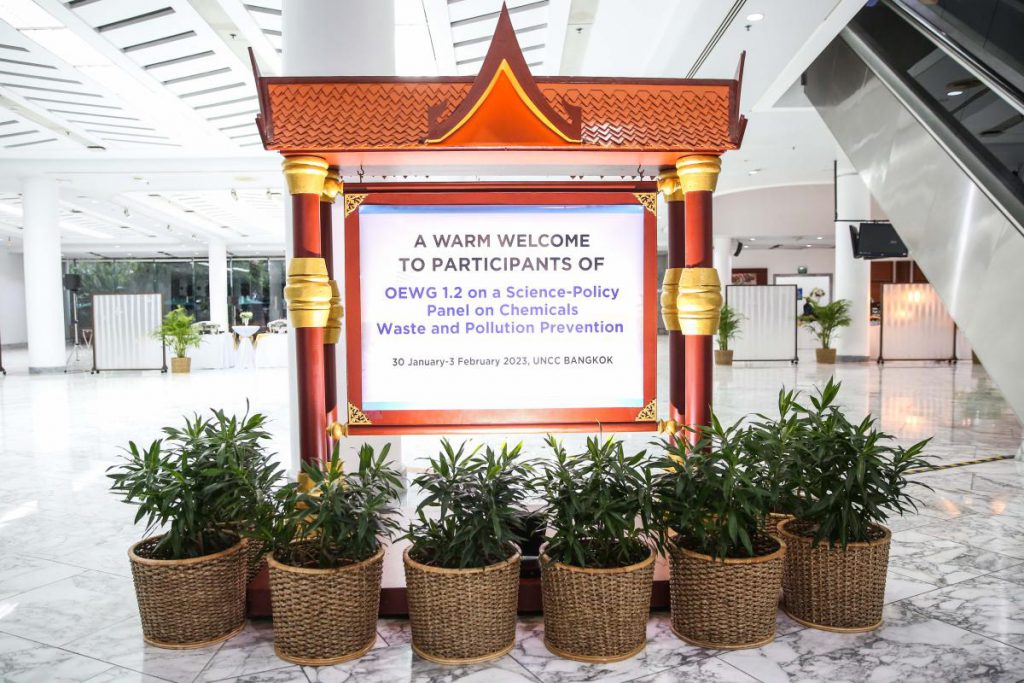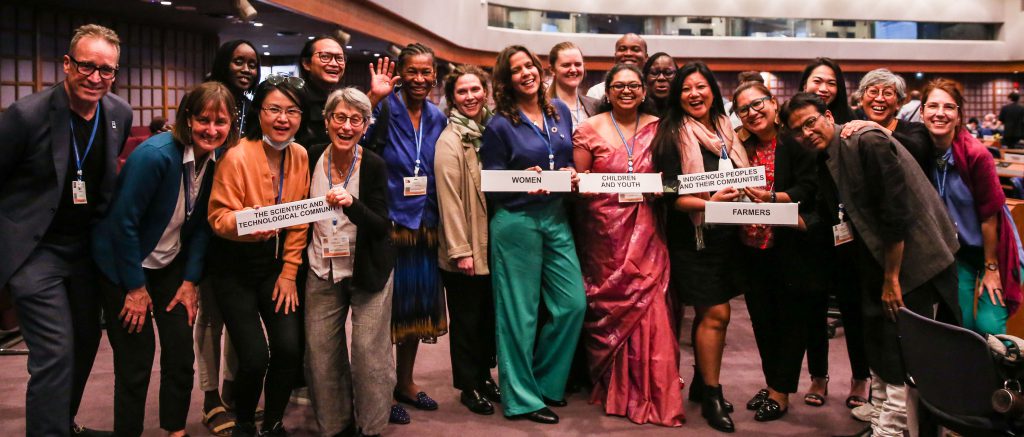February 10, 2023 Reposted from Gender & Chemicals
Article by Anna Holthaus

Entrance OWEG-1.2, Bangkok, photo by IISD/ENB.
The resumed first session of the ad hoc open-ended working group (OEWG) on a science-policy panel to contribute further to the sound management of chemicals and waste and to prevent pollution took place in Bangkok, Thailand, from January 30 to February 3, 2023 (UNEP, 2023).
Global chemicals production is expected to double by 2030 (GCOII, 2019) but we still know little about the impacts of chemicals and hazardous waste and pollution on our health and the environment. That is why the need for a science-policy panel has been discussed for years under the Strategic Approach to International Chemicals Management (SAICM). In 2021 and 2022 the United Nations Environment Assembly (UNEA), in its resolution 5/8, finally decided that a science-policy panel should be established to contribute further to the sound management of chemicals and waste and to prevent pollution. This UNEA decision marks a historic point: soon all three areas of planetary environmental crisis will have their own science-policy interface. Climate change has the IPCC, biodiversity loss the IPBES, and the establishment of a new science-policy body on the pollution crisis is planned to be completed by the end of 2024.
An open-ended working group (OEWG) was established to prepare proposals for the new panel. The first session of the OEWG was held in two parts: The first part took place on 6 October 2022 in Nairobi in a hybrid format,; and the resumed first session (OEWG-1.2) was held in person at the United Nations Conference Centre in Bangkok. The discussions focused on the scope and functions of the panel. A summary report by the ENB is available here.

Advocacy for a gender-responsive science-policy panel
Anna Holthaus from the MSP Institute attended OEWG-1.2 to work together with other women’s groups and feminists of the Women’s Major Group (WMG) to increase attention to the gender aspects of chemicals, waste and pollution and to the need for a gender-responsive panel. Gender-responsiveness means consciously incorporating gender considerations into the design, implementation, and outcomes of programs and policies – and the approach is used widely at the international policy level (e.g. by UNFCCC, CBD or WHO).
The Women’s Major Group submitted a written statement for OEWG1.2, our colleague Mrinalini Rai from Women4 Biodiversity delivered the WMG’s intervention in contact group 1 on function and scope of the panel, and Anna gave a closing statement in plenary on behalf of the WMG.
Fortunately, gender aspects were also immediately an issue in the discussions of this first session: delegates added the preparation of a gender policy and implementation plan to a list of possible documents to prepare, and decided that this shall be further discussed at the next session. “Activities to ensure (…) gender-responsive participation of scientists” was mentioned in a text proposal on capacity building by the GRULAC and African regions and will be also discussed further at the next meeting. In addition, several Member States like Mexico, Brazil and Chile as well as non-governmental organizations and Major Groups supported the need for a gender-responsive panel during the week.
Background: a massive lack of gender data and research
We believe that a gender-responsive science-policy panel can be an important driver in identifying and addressing gender inequities in chemicals, waste, and pollution prevention, which is urgently needed due to the lack of gender-specific data and research on chemicals, waste, and pollution, as stated below:
“Overall, there is limited data or hard numbers on how different gender roles differentially expose men and women to hazardous chemicals.” (SAICM, 2017)
SAICM/IPEN stated in 2020 that „gender-disaggregated data in labor statistics is unfortunately often lacking for occupational exposure to hazardous chemicals. This lack of data makes occupational epidemiology challenging in many cases.”
„It should be noted that exposure data from most developing countries and countries in transition is scarce and that sex- and gender-disaggregated data is largely missing for most of the [SAICM Emerging Policy Issues].” (ibid.)
Let’s learn from IPBES and IPCC’s gender activities
The need to acknowledge gender equality issues and to strengthen gender-disaggregated data has also been acknowledged by the Convention on Biological Diversity and the United Nations Framework Convention on Climate Change.
IPBES Assessments are undertaken by a gender-balanced multidisciplinary group of independent experts. IPBES operating principles recognize the need for gender equity in its work.
IPCC adopted its Gender Policy and Implementation Plan in 2020, based on a report of the Task Group on Gender. The Plan aims to enhance gender equality in IPCC processes, to promote a gender-inclusive environment and to raise awareness of gender-related issues.
How to create a gender-responsive science-policy panel
To ensure that the new Science-Policy Panel promotes gender equality and the empowerment of women and girls, we suggest that the OEWG should:
- Ensure gender parity among members of the science-policy panel
- Establish a gender-inclusive working environment[1]
- Involve gender experts and the expertise of women’s organizations
- Create a working group on gender
- Establish the collection and use of gender-disaggregated as a scientific standard
- Strengthen gender research (e.g. via a special report or special chapters in reports)
… and we are looking forward to working with all involved actors to make this happen!
For us, the week in Bangkok was a great opportunity to meet with wonderful feminists and organizations working in different MEAs and environmental policy areas to share experiences in gender advocacy and join forces, and to discuss the importance of gender data and research with the scientific sector, other civil society groups, and of course with governments.
[1] A gender-inclusive working environment means to provide the entire workforce with safe, inclusive, and healthy work and educational environments in which no one is, on the basis of sex, sexual orientation, or gender identity, excluded from participation in, denied the benefits of, or subjected to discrimination. The term is used by Universities (e.g. Harvard University Guidlines) and by the IPCC, among others.


